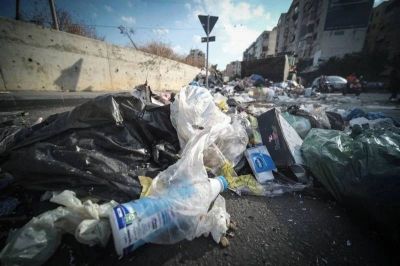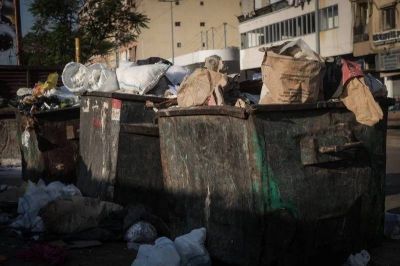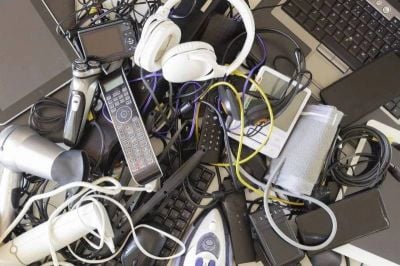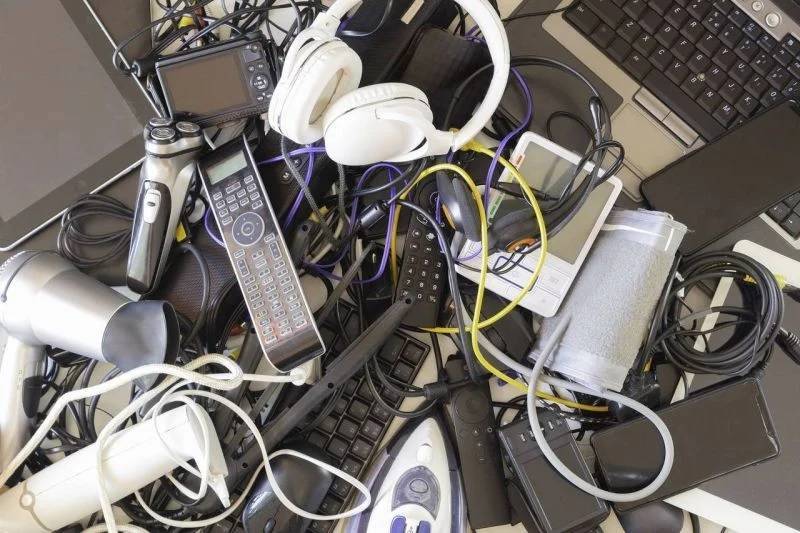
Electronic waste, a real modern-day headache. (Credit: Illustrative photo from Bigstock)
Soil pollution, unsafe water, polluted air — the time bomb of household waste is a global issue, but in Lebanon it is particularly concerning due to the lack of adequate infrastructure and awareness. Homes and offices dispose of products that are sometimes toxic, flammable or corrosive, and it would be better not to find them in nature. Instead, they often end up in official or illegal landfills. Here is an overview of these types of waste that deserve special attention, along with some solutions present in Lebanon, often the result of private or associative initiatives.
Electronic waste and batteries
- How dangerous are they? These items include used computers and phones, electronic devices of all types, not to mention expired batteries and individual car batteries. According to Samar Khalil, an environmental management expert, the risk associated with these waste products is linked to heavy metals (such as lithium and mercury) and other highly toxic and/or flammable substances they contain. These substances pose a certain environmental and health risk if released into the environment. They can contaminate water, soil or other waste in landfills, or release toxic fumes if illegally incinerated, posing a high risk of respiratory diseases.
- What is the recommended treatment? In terms of national policies, Khalil mentions certain measures to be taken at the importation level, which prioritize the return of end-of-life devices to the producing countries. These devices can also be dismantled and recycled on-site, with the necessary precautions, which requires a certain level of specialization.
- What solutions exist in Lebanon? There are NGOs and businesses currently accepting such waste in their facilities, such as Ecoserv, Arcenciel, Lebanon Waste Management, L’Écoute, Live Love Recycle, and ReFuse. Yalla Return also collects electronic waste for resale. These products are typically dismantled and recycled on-site or exported. However, Gaby Kassab, the founder of Ecoserv, warns against selling such waste directly to scrap dealers, who are only interested in the metal component. This poses the danger of other components being discarded without caution in the nearby environment or even openly incinerated.
Medicines and medical treatment waste
- How dangerous are they? Khalil argues that certain components of expired medications, such as antibiotics, for example, can become very harmful or polluting if they end up in the environment, especially when they re-enter the food chain. Some medical treatments administered at home produce potentially contagious or toxic residues as well.
- What is the recommended treatment? Samar Khalil points out that some consumer countries have producer take-back policies in place. Special bins are usually placed in pharmacies for the disposal of expired medications. In producer countries, they are often incinerated. Other preventive measures exist, such as in India, where medications are typically sold without packaging, allowing consumers to purchase only the prescribed quantity. In the case of treatment residues from administering medications at home (for chronic illnesses, cancer etc.), they should also be sent to specialized centers for proper disposal.
- What solutions exist in Lebanon? Regarding expired medications, there isn’t really a solution in Lebanon yet. Cedar Environmental has developed technology that allows the use of pills in the construction of concrete-like structures but has not yet obtained permission from the Health Ministry for its use. Arcenciel is responsible for decontaminating waste generated by hospitals but does not accept expired medications or treatment residues from home administration. Khalil recommends disposing of them separately and in a safe manner, while trying to decontaminate them at home, using bleach, for example, and placing sharp objects such as syringes in plastic containers to avoid risks.
 In producer countries, unused medications are often incinerated. (Credit: Illustrative photo from Bigstock)
In producer countries, unused medications are often incinerated. (Credit: Illustrative photo from Bigstock)
Bulky waste, metals and tires
- How dangerous are they? Some used furniture, end-of-life household appliances and other bulky items can contain more or less dangerous and toxic materials depending on their composition, according to Khalil. Furthermore, their size complicates the treatment and disposal process. Unfortunately, tires are often openly incinerated, a common practice during protests, and they emit extremely toxic smoke that is harmful to health.
- What is the recommended treatment? Furniture, large household appliances and other bulky items could be rehabilitated and reused. Therefore, it is important, according to Samar Khalil, to ensure that they are not completely irrecoverable before discarding them. For example, furniture can be dismantled, and its components can be used separately. Tires can also be disassembled and recycled into other common rubber objects.
- What solutions exist in Lebanon? Until about 15 months ago, bulky waste was transported to a landfill specifically designed for this purpose, located in Bsalim, but this site is now saturated and closed, according to a government source. Currently, like almost all household waste (as the state’s capacity for sorting and treatment is almost non-existent), such items end up in official or illegal landfills. However, local NGOs and businesses can recover and recycle certain large appliances, such as Ecoserv, as well as industrial metals, like Live Love Recycle. Metals are also recovered by other organizations or companies like Lebanon Waste Management, Refuse or Arcenciel. In Lebanon, there is also an informal collection circuit through scrap dealers who sell metals abroad.
As for tires, according to various sources, their recycling in factories (in Nabatiyeh and Hermel) remains problematic as it relies on their incineration (for metal recovery or fuel production). However, the company Petro Rubber, based in Joun (South Lebanon), stands out by using cutting and shredding machines for tires that it purchases from wholesalers to manufacture rubber granules and gymnastic mats.
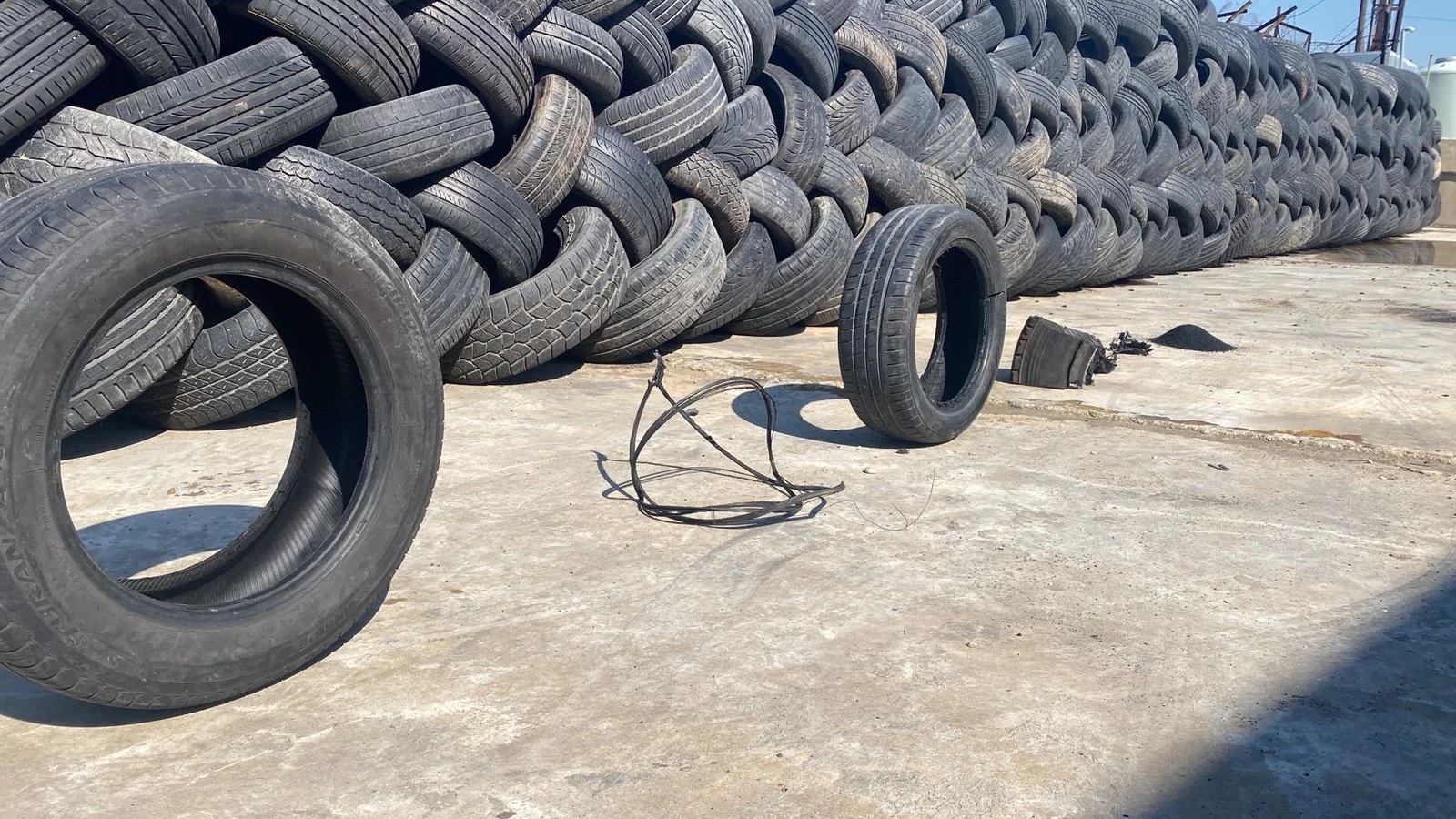 Used tires transformed into everyday rubber products. (Credit: Photo courtesy of Petro Rubber)
Used tires transformed into everyday rubber products. (Credit: Photo courtesy of Petro Rubber)
Household chemical products and used oils
- How dangerous are they? People often don’t realize the number of chemicals used in households without any suspicion, and yet they can be a source of danger during use (toxic, corrosive, flammable materials, etc.) and when disposed of in landfills. Chlorine, bleach, and even alcohol are among these products, as Samar Khalil points out. When released into the environment, these products release substances that are toxic to the environment and health, posing a risk of soil and water contamination, as well as air pollution in the case of illegal incineration. When toxic liquid materials are poured down the drain, they end up in wastewater systems. At this stage, the lack of adequate treatment plants in Lebanon is detrimental, as these substances ultimately end up in bodies of water.
Used cooking or motor oils should not end up in the environment without treatment. The risk associated with cooking oil is more environmental than health related, as it affects marine or river wildlife. Oils resulting from vehicle oil changes are typically collected by gas stations or mechanic garages, which may not always have the necessary means (or sufficient awareness) to dispose of them safely.
- What is the recommended treatment? Both household chemical products and used oils should be stored separately and sent for treatment at specialized centers, recommends Khalil. She adds that at AUB, where she is responsible for environmental management, special containers have been provided for this purpose, and the products are collected by type and then exported in accordance with international standards.
- What solutions exist in Lebanon? Some NGOs and businesses accept these types of products, such as Lebanon Waste Management, which recycles used oils. Refuse collects both kitchen and car oils and sells them to small industries for soap or other manufacturing. Live Love Recycle collects them for export to biofuel manufacturing industries.
Textiles
- How dangerous are they? Textile waste is currently a major global issue, driven by the rise of what is known as “fast fashion.” Textiles can also contain chemicals in their dyes or plastics, all of which can be released into the environment over time and contribute to soil and water pollution.
- What is the recommended treatment? In the case of textile waste, prevention is even more crucial than the prospect of treatment, according to Khalil. She recommends opting for fewer and more environmentally friendly purchases. Otherwise, one should consider donating clothing, reusing fabrics, and recycling.
- What solutions exist in Lebanon? Some NGOs, businesses or even designers collect used clothing for upcycling (transforming them into high-value-added products). In the field of recycling and reusing used clothing, the most specialized organization is FabricAid. According to their marketing manager, Loulia Halwani, nearly 80 percent of the clothing collected (via 300 bins throughout Lebanon) is resold at very low prices in outlets located in marginalized areas. The rest is sent to sewing workshops or resold in stores.
Organic Waste
- How dangerous are they? Residues from gardening, forest pruning or agriculture do not pose a particular environmental or health problem, but their volume adds to already saturated landfills. There is also a risk of fire.
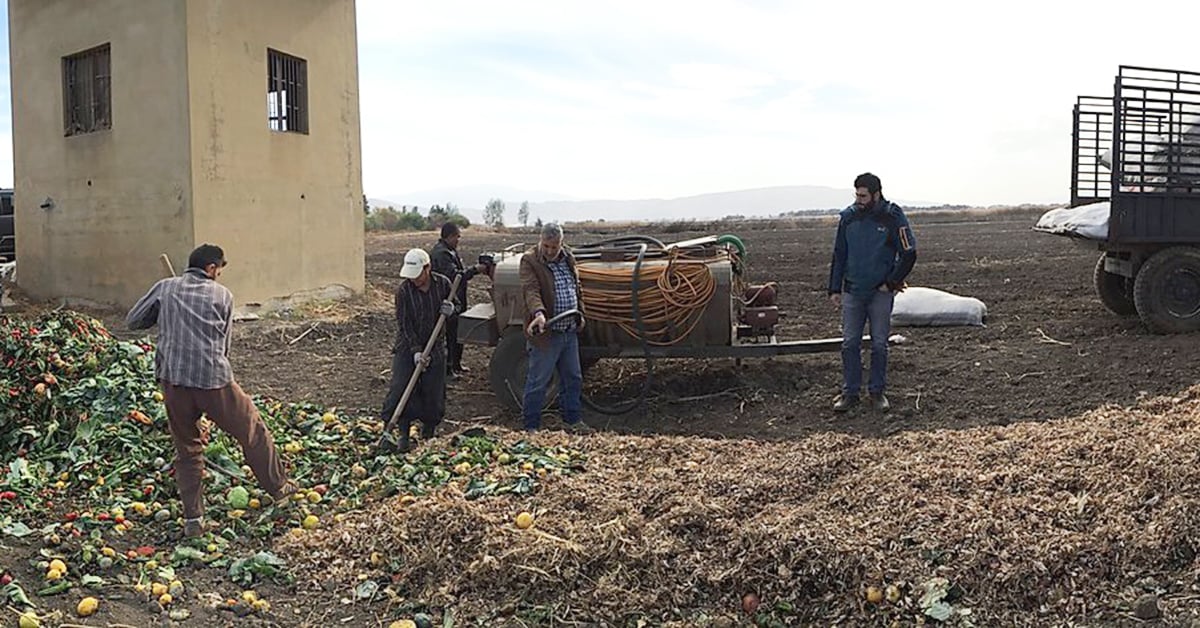 Organic waste is often perfect for quality composting. (Credit: Photo taken from the Compost Baladi website)
Organic waste is often perfect for quality composting. (Credit: Photo taken from the Compost Baladi website)
- What is the recommended treatment? These organic waste materials are perfect for composting. If they are not contaminated by other toxic materials, these residues can be transformed into high-quality soil enrichers.
- What solutions exist in Lebanon? In Lebanon, there are specialized NGOs like Compost Baladi that offer home composting training and the option to deposit organic waste for free at their Hazmieh center. Cedar Environmental and Terre-Liban provide composting solutions to municipalities. Regarding individual households, the former can collect their waste, while the latter offers consultations on home composting.
This article was originally published in French by L'Orient-Le Jour. Translation by Sahar Ghoussoub.
